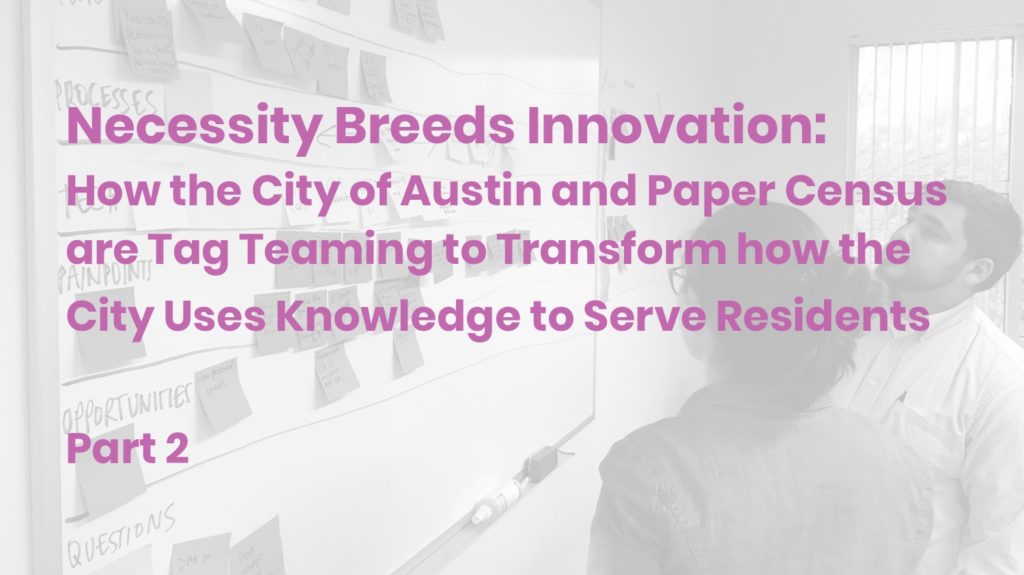Part 2
By Puja Balachander, User Researcher, City of Austin Communication and Technology Management, Office of Design and Delivery, and Sarah Ortiz Shields, Program Manager, Austin Tech Alliance
Imagine a city with a single front door, where no matter what a resident needed, the city would use all the information it had to collaborate and seamlessly deliver services to them. Advancing the City of Austin towards this vision was what Austin Tech Alliance and Office of Design and Delivery were tasked with through two separate projects: Paper Census and City Knowledge Management and Collaboration.
Austin Tech Alliance is a nonpartisan nonprofit founded to promote civic engagement in Austin’s tech sector. Our focus is on educating the tech grassroots on policies that impact pthem, advocating for using tech as a tool to help solve civic challenges, and activating the tech sector to speak up, participate, and vote. ATA’s Paper Census project is a collaboration with the City of Austin to identify paper-based processes that are a hassle for residents, then research, design, and deliver digital prototypes.
The Communication and Technology Management’s Office of Design and Delivery provides an opportunity for Austin’s passionate and civic-minded designers and developers to bring the principles, values, and practices of the technology sector into government. The Knowledge Management and Collaboration project is an effort to help the City of Austin to use the information it collects and creates to better collaborate and deliver seamless services to residents.

In our last post, we left you with the update that we’re now working with three high impact City of Austin service teams to help them use the information they collect, create, and access in order to better serve Austin residents. As even more teams from across the City are reaching out for the “knowledge management treatment” we’ll be able to line up even more departments, and prioritize working on those with the greatest community impact.
We’re kicking off this process with three brave service teams who have decided to collaborate with us:
- The first is Austin Transportation Department’s Residential Parking Program. Over 2,500 residents annually apply for, and receive over 7,500 residential parking permits (RPPs) every year. By updating its paper- and time-intensive application and enforcement process, this service can take advantage of existing City mapping data to ultimately make this process easier and more efficient for residents.
- The second team is Austin-Travis County Emergency Medical Services’ Fall Prevention Program (FPP). After vehicle accidents, the leading cause of 911 calls are for falls. FPP provides essential hazard mitigation services to help healthy seniors avoid falls in their homes; however the program isn’t well known amongst the community, and the service platform technology within EMS is underutilized. Since this is a new program, the process for contacting the FPP is largely email and phone-based – updating these processes will allow EMS to promote and ultimately help more seniors in our community.
- The third team we’re working with is the Parks and Recreation Department’s Aquatics Division (PARD). Every year, PARD hires 500+ temporary employees who work as lifeguards, cash collectors, and other staff at Austin’s 51 public pool facilities. These employees are essential to helping Austinites enjoy our best public amenities, yet the process for hiring them is paper-based and time intensive. For example, one bottleneck is that in order to hire a minor, the City requires a guardian to sign off on the hiring forms. Currently eSignatures are not allowed, so applicants are required to obtain paper signatures. This has led to delayed park openings for the past two years.

We’re now conducting research with the RPP and FPP teams to better understand their knowledge challenges and needs. Next, we’ll be sharing our findings, kicking off ideation and prototyping for these projects, and starting research with PARD. Our hope is to have some citywide knowledge management guidelines by the end of September.
If this is exciting and you want to be involved, reach out! We have a few specific ways we could use your help:
- Stay up to date, help us prototype, and attend one of our workshops! Visit papercensus.org/get-involved to sign up.
- Are you part of a City service team that wants to work with us? Would you like to be invited to our share outs, and learn about what we’re learning and our process? Contact puja.balachander@austintexas.gov and sarah@austintech.org today.

